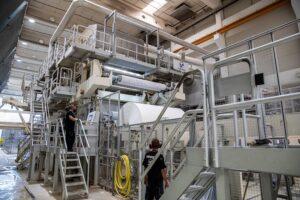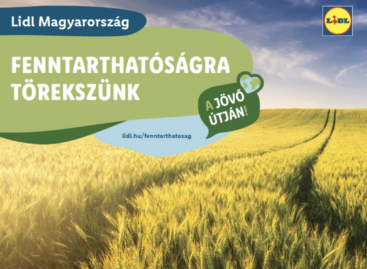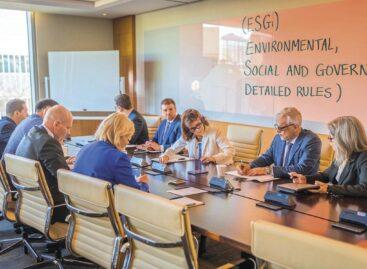Hungary’s leading hygiene paper company, Vajda-Papír, will become carbon neutral by 2050
By 2030, Vajda-Papír will increase the use of renewable energy by 50% and reduce its water consumption by 20%.

Vajda Papír Kft., Dunaföldvár.
Over the past 10 years, Vajda-Papír Kft. has spent HUF 40 billion on the production and operation of hygienic paper using the most environmentally friendly, sustainable technologies. The goal of further developments of a similar magnitude is to make the operation carbon neutral by 2050 with a significant reduction in the ecological footprint, announced Attila Vajda, the managing director of Vajda-Papír. In the spirit of sustainable development, Hungary’s market-leading sanitary paper manufacturer undertakes to reduce water consumption by 20% by 2030, further reduce waste production and increase the use of renewable energy by 50%. Sustainable operations and social responsibility have been an important aspect in the life of the Hungarian-owned family business from the beginning; the results to date and the goals are described in the company’s ESG report. This year, Vajda-Papír published an ESG report for the first time, in which it presents to its colleagues, customers and partners its aspirations, goals, measures taken and results achieved so far in the fields of environmental protection, social protection and corporate governance. The ESG report ensures companies’ transparent communication on the topics of sustainable operations and social responsibility. And for Hungary’s market-leading hygiene paper manufacturing company, sustainability has long been at the heart of its business strategy and operations. Among the industrial production companies, Vajda-Papír was one of the first to publish its ESG report.
We consider our commitments on the road to zero emissions to be fulfilled by 2050 to be our defining task – announced Attila Vajda, managing director of Vajda-Papír
He added: as part of this, we will reduce our water consumption required during production and operation by 20% by 2030, we will further reduce waste production through prevention, reduction, recycling and reuse, and we will increase the share of renewable energies in our own operations and by 50%. at the locations of our company group. We are expanding the range of sustainable hygiene products, we are working to ensure that the number of environmentally conscious products reaches 45% by the end of 2023. Attila Vajda emphasized that 140,000 tons of paper products are produced annually in a particularly energy-intensive area, which is a huge responsibility. “We manufacture with sustainability in mind, with respect for our environment, with a responsible attitude towards our employees and with efficiency in mind when using the available raw materials, energy and water, and when planning transport routes,” he emphasized. The key to our sustainable development is our roadmap until 2030, which sets clear goals in line with the UN Sustainable Development Goals, the company manager emphasized.
On the occasion of the publication of Vajda-Papír’s first ESG report, Attila Vajda summarized the sustainability milestones in the company’s life
He mentioned that in 2021 the group of companies was the first among industrial production companies in Hungary to issue a green bond. With this, he played a leading role in green financing and proved the company management’s commitment to sustainability and environmental awareness, he said. The HUF 9.9 billion issue partially financed the expansion of the Dunaföldvár plant, one of Europe’s most modern and energy-saving sanitary paper factories, the creation of self-sufficiency in raw material production and the doubling of capacity.
Attila Vajda emphasized: the main pillars of Vajda-Papír’s ESG strategy are the following
Environmentally friendly production with modern, environmentally friendly technical solutions; the use of fibers from certified responsible forest management for environmentally conscious raw material procurement; environmentally conscious operation and operation, as part of this, environmentally conscious transport, which involves less CO2 load. One of the important elements of sustainability efforts is consumer education about environmentally friendly products (green labels). “As a responsible leader, we pay special attention to achieving our sustainability goals, and I consider it crucial that we also meet the gradually strengthening, ESG-specific regulatory expectations. My goal is for the ESG approach to permeate the entirety of our company group, and to set an example for others to reduce our ecological footprint,” said Attila Vajda. As a result of the innovative solutions of recent years, the factories only use cellulose raw materials from FSC®-certified responsible forestry and other controlled sources, and all by-products generated during production are used. Last year, as the second phase of the development of Europe’s most modern paper factory, the huge-capacity raw material production plant (80 thousand tons/year) was handed over in Dunaföldvár, which will cover 100% of the company’s raw material in his demand. By eliminating the previous raw material delivery, more than 400,000 liters of fuel can be saved annually, which also results in a significant reduction in CO2 emissions. In the framework of efficient waste management at the production sites, 100% of the waste generated from the paper raw material is recycled.
Their manufacturer brand, Ooops! the environmentally friendly production method is also indicated on the product packaging
As Attila Vajda explained, during their innovative product development, they take into account current market trends and serve the needs of their environmentally conscious consumers. They prioritize consumer education and consider it essential to draw consumers’ attention to the possibility of choosing environmentally conscious products. With the label “ECO friendly solutions”, Ooops! branded products already account for almost 30% of production, and the goal is for the proportion of environmentally conscious products to reach 45% in 2023. Reducing the environmental burden is also a key consideration in the choice of packaging materials. “We increased the proportion of recycled materials in the majority of plastic primary and secondary product packaging to 60%, thereby reducing the use of new plastic by 600 tons annually,” explained the company manager. “Our green strategic goals set out in our green bond framework include the reduction of water consumption during paper production in Dunaföldvár from 12 m³ per ton to at least 5.5 m³ by 2030, as well as the reduction of specific energy consumption to below 2,800 kWh/ton, as well as 50% of the use of renewable energy increase and a 5% decrease in carbon dioxide emissions,” listed Attila Vajda. After the biological purification of the water produced during paper production, 50% is returned to the Danube river, the other 50% undergoes another filtration through special equipment, and this amount of water can be reused during paper production, he emphasized.
In order to reduce waste by 2030, they strive to reach an agreement with their retail partners
Rolled products should appear in stores in pallet packaging instead of secondary packaging, which saves nearly 1 kg of LDPE film per pallet, significantly reducing the environmental footprint. Packaging on pallets will be 20% of the total volume sold, explained the company manager. In the factories, they use 100% electric powered lifting machines and electric forklifts to perform logistics tasks, and they operate the most efficient company car and truck fleet, with the highest EURO6 engine compliance. CO2 and other emissions savings equivalent to 171,500 liters of fuel were realized with the electric forklifts in the last 4 years. “During the expansion of our own fleet of transport vehicles, we prioritize the purchase of low-emission vehicles, we have expanded our transport fleet with 17 modern tractors. Our long-term plans include the acquisition of electric trucks and the construction of an infrastructure suitable for charging them, he said.
Attila Vajda touched upon the significant contribution of the company group to the restart of the vocational training in the paper industry, which had ceased more than twenty years ago
“We took the lion’s share in restarting professional training in the paper industry, in preparing the educational materials necessary for education,” he said. He also emphasized that the paper industry has undergone enormous development, technology is changing rapidly, which is why today we need more and more qualified, creative, thinking employees who can quickly adapt to changes. For this reason, relaunched vocational training is indispensable in such a rapidly expanding market, where the added value, the contribution to the GDP, the number of employed people and the value of investments increase spectacularly every year. He emphasized: they are committed to the preservation, development and long-term maintenance of the paper industry profession and education.
According to the plans, the corporate management, which has social responsibility in mind, will establish a foundation by December 31, 2023 to help the needy even more effectively
Attila Vajda reported that since the establishment of the family business 24 years ago, they have been supporting local communities and actively participating in supporting the needy. “We are outstanding supporters of the institutions of the Hungarian Maltese Charity Service and the Patient Order of Mercy. It has now become a tradition in the life of our company that we regularly donate the products we manufacture to those most in need”. The cooperation with the charity service began in 2020, since then more than 42,000 kilograms of hygiene paper goods have been donated to support opportunity-creating programs for children, and hundreds of disadvantaged families have been provided with enough hygiene paper goods for a year across the country.
Vajda-Papír was founded 24 years ago as a family business and employs approximately 650 employees at the group level. In addition to sales in Hungary, the company’s hygiene paper products are delivered to more than 30 countries around the world, 60% of the group’s total production of hygiene paper products is sold on export markets. The company also entered the market in Norway in 2013, they employ more than 130 workers in their factory there.
Related news
The majority of Hungarians spend less than 50 thousand forints on Christmas gifts, sustainability is an important aspect, but not the primary one
Gift-giving is an essential holiday tradition, but what really matters…
Read more >Lidl has published its 3rd sustainability report
Lidl Hungary’s sustainability report for the 2022/2023 business years has…
Read more >ESG – about sustainability standards, from a legal perspective
Since December 2023 several pieces of legislation have been published…
Read more >Related news
The Joy of Giving! – SPAR stores collect non-perishable food for people in need
The Hungarian Maltese Charity Service and SPAR Hungary have launched…
Read more >Technological advancements and business travel
The latest research from International Workplace Group (IWG), the leading…
Read more >K&H: a gift, but what and from which store?
When it comes to Christmas gift-giving, clothes are the most…
Read more >






